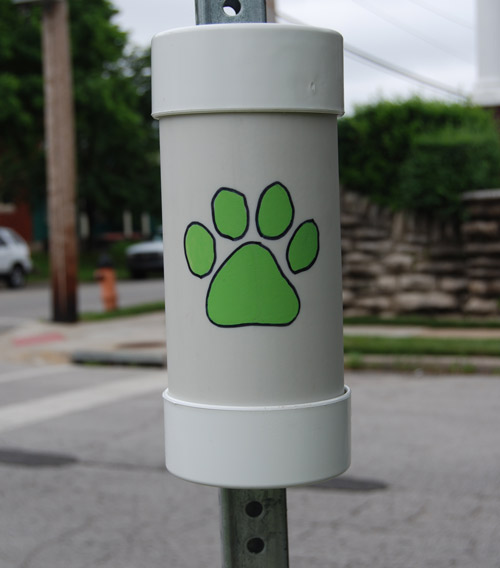By Tina Moessner
Did you know that dog poop is a source of urban water pollution? The average dog produces 274 pounds of waste per year, according to the U.S. Department of Agriculture. When left on the ground, it’s not considered a natural “compost,” but is harmful to our waterways.
Dog poop contains possible bacteria and viruses that can end up in storm sewers that flow directly into bodies of water untreated, if it’s left on the ground. Once washed into waterways, it can harm fish and wildlife, and with the nutrients it releases and fertilizer run-off, it can cause algae blooms that make water uninhabitable. Not only that, but leaving poop is unneighborly and sometimes illegal.
PAWS Program
 To make it easier to scoop your poop, Green Works in Kansas City recently created the PAWS Program to encourage dog owners to pick up waste. PAWS is a waterproof outdoor container that holds plastic bags for dog owners to use to clean up after their pets. Created by students in the Green Works program, PAWS stands for Poop Away, Water Safe. Green Works provides environmental education and workforce development for urban high school students.
To make it easier to scoop your poop, Green Works in Kansas City recently created the PAWS Program to encourage dog owners to pick up waste. PAWS is a waterproof outdoor container that holds plastic bags for dog owners to use to clean up after their pets. Created by students in the Green Works program, PAWS stands for Poop Away, Water Safe. Green Works provides environmental education and workforce development for urban high school students.
The PAWS container is filled with reusable plastic bags from grocery stores or newspapers. It can be installed on a metal or wooden post, ideally near a trash receptacle. Be sure to check with your local municipality or neighborhood group to ensure it isn’t breaking any rules. The containers cost $20, and can be ordered by contacting Kate Corwin, Green Works president, at kate@greenworkskc.org. The proceeds will benefit the Green Works program.
Many apartment complexes and parks already have pet waste stations. Look for these on your next dog walk.
What to do with dog waste
1. Flush it
One of the most eco-friendly and easy options is to flush it (don’t flush the bag), according to the Natural Resource Defense Council. Rather than ending up in a landfill, it will be treated with human sewage. The Kansas City, MO Water Department encourages flushing dog waste.
2. Use a poop collection service
If you really don’t want to pick up poop, consider hiring an outside service. Eco-Scoopers is a local eco-friendly dog poop removal service that uses biodegradable bags to pick up waste, which is then composted.
3. Bury it
It is safe to bury pet waste in your yard, according to the Mid-America Regional Council. To do this, bury it at least 12 inches deep and cover it with at least eight inches of soil to let it decompose slowly. Bury the waste in several different locations and keep it away from vegetable gardens.
4. Compost it
You can also compost your dog’s poop to keep it out of the landfill. When composting pet waste, keep it in a bin separate from food-related compost, according the United States Department of Agriculture. The finished product can be spread on ornamental plants, but not on food crops. For instructions on pet waste composting, read the USDA’s Dog Waste Composting Guide at www.nrcs.usda.gov.
Biodegradable poop bags sometimes work, but they only decompose in certain conditions. Most bags will not decompose fast enough in a sealed landfill, according to EarthTalk. They are often made of more eco-friendly plant-based materials, which is a plus, but check the packaging or company website to confirm if it will decompose at landfills.
For feline friends
Flushing cat waste is not recommended as a disposal method because of concerns about the parasite Toxoplasma gondii, sometimes found in cat feces. Research indicates the parasite could survive the wastewater treatment process and endanger mammals. Because of this, it is recommend you put cat waste in the trash.
To learn more about local stormwater management, check out the Kansas City, MO Resident Stormwater Booklet.
Top photo: In the morning we swim rivers // CC BY

What can possibly be “green” about disposing of dog poop in plastic bags?
The city’s water department might thing it’s OK to flush dog waste, but last time I checked it was a violation of federal law to put anything in the sewer system that wasn’t HUMAN in origin. Ya might wanna check.
In fact, many sources include flushing as a solution. We did a lot of research before including it.
Here is a report from the Environmental Protection Agency’s Office of Water that encourages flushing: Managing Pet and Wildlife Waste to Prevent Contamination of Drinking Water.
Excellent article about dog poop. You should emphasize that storm water runoff will sweep any dog poop lying on the ground directly into our lakes and streams, killing fish and other aquatic creatures and creating toxic algae that endangers or prevents any enjoyment of the water for recreation.
Yes. I agree completely. Even I am also doing the same. I use to just flush my dog’s poop so as to keep my family away from diseases.